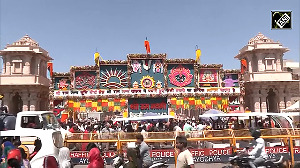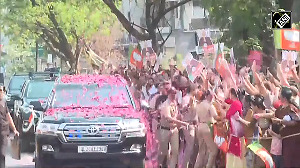Former president Pranab Mukherjee, statesman, scholar and one of India's most respected leaders across the political spectrum, died on Monday evening following a 21-day battle with multiple ailments. He was 84.

Mukherjee, who was admitted to the Army's Research and Referral Hospital on August 10 and was operated for a removal of a clot in the brain the same day, is survived by two sons and a daughter.
The long-time Congress leader and seven-time parliamentarian, known for his encyclopaedic memory and insights into varied issues, had tested positive for COVID-19 at the time of his admission and was being treated for a lung infection. He suffered a septic shock on Sunday and died of a cardiac arrest at 4.30 pm, the hospital said.
A health bulletin on Monday morning said he was in a deep coma and on ventilator support.
The funeral will be held at 2 pm on Tuesday at the Lodhi Road crematorium, his family said.
The government announced seven-day state mourning from August 31 to September 6. The national flag will fly at half-mast on all buildings throughout India, where it is flown regularly, and there will be no official entertainment, the home ministry said in a statement.
Mukherjee's son Abhijit was the first to break the news of the death of the veteran politician, the Congress's troubleshooter through the decades who became India's youngest finance minister when he was just 47 and also held the portfolios of external affairs and defence in the years that followed.
"With a heavy heart, this is to inform you that my father Shri Pranab Mukherjee has just passed away inspite of the best efforts of Doctors of RR Hospital and prayers, duas and prarthanas from people throughout India! I thank all of you," his grieving son said on Twitter.
As condolences poured in for India's 13th president, who served as the country's first citizen from 2012 to 2017, President Ram Nath Kovind described Mukherjee's demise as the passing of an era.
"A colossus in public life, he served Mother India with the spirit of a sage. The nation mourns losing one of its worthiest sons. Condolences to his family, friends & all citizens," Kovind said on Twitter.
Expressing his condolences, Prime Minister Narendra Modi described him as a scholar par excellence and a towering statesman who was admired across the political spectrum.
"India grieves the passing away of Bharat Ratna Shri Pranab Mukherjee. He has left an indelible mark on the development trajectory of our nation," Modi tweeted.
Known as a consensus builder, the West Bengal born Mukherjee spent much of his five decades in public life as a Congress worker but also inspired trust among leaders across political divides. Modi and Mukherjee came from opposing ideologies but developed a close working relationship.
In a series of tweets, the prime minister said Mukherjee in his decades-long political journey made long-lasting contributions in key economic and strategic ministries. He was an outstanding parliamentarian, always well-prepared, extremely articulate as well as witty, Modi said.
Modi also posted his pictures with Mukherjee, including one in which he is seen touching the then president's feet.
In her condolence letter to Mukherjee's daughter Sharmistha, Congress chief Sonia Gandhi said his life over the past five decades mirrored 50 years of India's history.
"He brought distinction to every post he held. He established a genuine rapport with colleagues across the political spectrum, and he served our country with the utmost dedication," Gandhi said.
"Pranab Da had been such an integral and prominent part of national life, the Congress party and the central government for over five decades, it is hard to imagine how we can do without his wisdom, experience, sage advice and deep understanding of so many subjects," she said.
Former prime minister Manmohan Singh and Mukherjee's colleague in the Congress said he had learnt a lot from him and depended on him a great deal for his wisdom, vast knowledge and experience of public affairs.
"In his death, our country has lost one of its greatest leaders of Independent India. He and I worked very closely in the Government of India and I depended on him a great deal for his wisdom, vast knowledge and experience of public affairs," he said.
Congress leader Rahul Gandhi said he joined the country in paying homage to the former president.
Communist Party of India general secretary D Raja offered his condolences to the family and said Mukherjee will be remembered for serving the people of the country in every post that he held.
"He (Mukherjee) was known for his political knowledge and kept good relations with leaders across parties. He had a phenomenal memory and his death is a huge loss for the country," he said.
Mukherjee -- who made it a point to remain in touch with his roots and was often seen leading Durga Puja prayers in his village, even in his president years -- was the man who took on all political jobs with ease.
When he became president in 2012, Mukherjee headed 24 of 39 GOMs (groups of ministers). Between 2004-2012, he chaired 95 GOMs.
While most of Mukherjee's political life was fairly non-controversial, his visit to the RSS headquarters in Nagpur in June 1988, a year after he demitted office, generated huge controversy. His Bharat Ratna in 2019 also became the centre of debate.
As president, he will be remembered for the tough stance he took on mercy petitions, rejecting 30 of the 34 mercy pleas presented to him.











 © 2025
© 2025